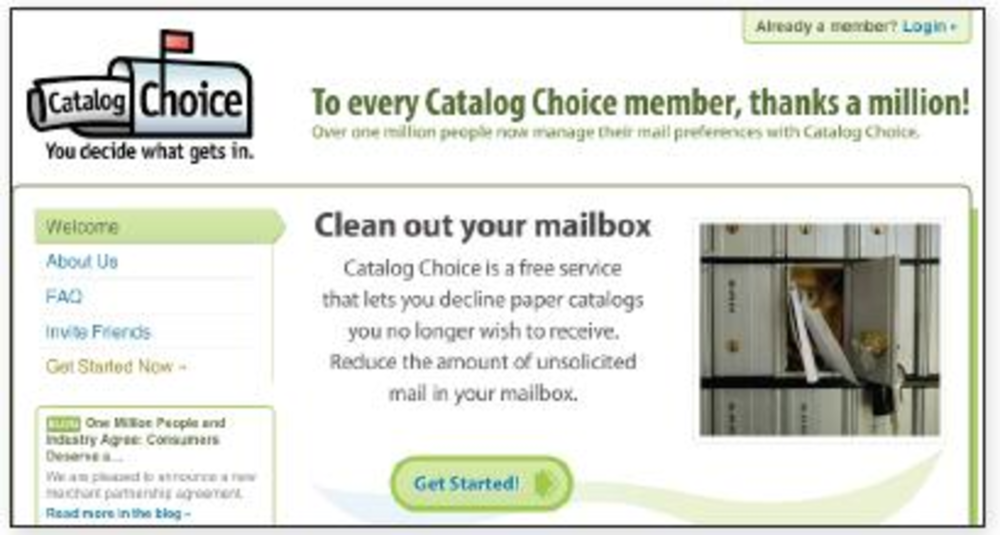Some of the catalog industry’s major players stood last week in support of mail preference service Catalog Choice, including Williams-Sonoma, Orchard Brands, LL Bean and Crate & Barrel. The kudos come barely a year after the service launched with a less-than-friendly reception from the industry. The Direct Marketer’s Association also made its own mail preference news last week, as word got out that it’s planning an upgrade of its DMAChoice mail preference service at its annual conference next month.
“Catalogers should make it easy for consumers to express their mail preferences — that’s a fundamental responsibility,” said Pat Connolly, EVP and CMO for Williams-Sonoma Inc., adding that, while DMAChoice is one option, he believes there is a need for another.
“There are a lot of consumers who see an independent third-party as credible,” Connolly explained. “The reason that the industry leaders chose to work with Catalog Choice is because it’s free, it’s easy to use and it abides by strict standards of privacy and names reuse,” he said, adding that “no other [third-party independent] service can meet these standards.” Currently, Williams-Sonoma only accepts names for opting out from DMAChoice, Catalog Choice and its own mail preference service.
Catalog Choice also received the endorsement of industry group American Catalog Mailers Association this week. ACMA created a task force last fall to investigate the growing number of mail preference services and is now asking catalogers to include Catalog Choice in their efforts to execute mail preference.
When Catalog Choice made its debut last fall as a third-party independent opt-out mail service, it was amid cries of outrage from some catalogers, who had never heard of this organization that was suddenly sending them lists of customers it wanted taken off of mailing lists. The DMA has also questioned the group’s motives, since it’s backed by environmental groups, the National Resources Defense Council and the National Wildlife Federation.
Catalog Choice hopes to put these concerns to rest now that several industry stalwarts have signed up. More than 1 million consumers have signed up for the service in less than a year. The DMA’s DMAChoice program has more than 4 million registered users.
“There’s no question that when we launched our service, there was a push back from the industry,” said Chuck Teller, executive director at Catalog Choice. He is hopeful the number of merchants signed up for the service will increase significantly in the coming months now that Williams-Sonoma and others have signed up. “It’s important to have some of the major merchants join” in order to provide leadership, he said. More than 260 merchants have signed up for Catalog Choice.
The muscle provided by these names is not only good for Catalog Choice but for the industry as well, said Teller. “Showing that a voluntary mail preference system works is an important step in showing that the industry can self-regulate,” he said, referring to the numerous Do Not Mail bills in state legislatures nationwide.
The rapprochement between Catalog Choice and the catalog industry came after months of conversations and work on developing a new licensing agreement with which merchants such as Williams-Sonoma would be comfortable.
The previous license agreement was mainly a software license and privacy agreement. “It wasn’t detailed in terms of the obligations it set forth for the merchants and it wasn’t explicit in terms of our obligations,” Teller explained. The new pact states Catalog Choice’s position to not advocate for federal or state legislation regarding Do Not Mail issues and insures that names collected through the service will not be rented, sold or exchanged with any third party unaffiliated with the service. The revised agreement gives mailers 90 days to act on mail preference requests.
Catalog Choice can now provide merchants with an e-mail address that is unique to each consumer and each catalog title, so merchants can send consumers an acknowledgement. Catalog Choice is not releasing consumers’ e-mail addresses.
“What we’ve done is develop a new customer service application,” Teller said of the newly robust Catalog Choice platform. The organization is also testing frequency preference with merchants, enabling consumers to choose how often they would like to receive catalogs during the year. In the coming months, Catalog Choice will provide retailers the ability to offer the Catalog Choice mail preference application as a hosted service on their own Web sites and with their own branding.
Within a year, the DMA’s mail preference program went from the Mail Preference Service, a binary opt-out list that charged consumers $1 to register, to DMAChoice, a free online registry that allows opt-outs on a company-by-company basis. DMA President John Greco said that the new service being announced next month will be more granular than previous offerings.
“We took [the MPS platform] as far as we could — but we knew we wanted to do more,” Greco said. In addition to mail opt-outs, the association plans to roll out an e-mail opt-out capability within the new platform. “It’s a really consumer-friendly portal representing more than just mail. It’s about informing merchants’ integrated marketing efforts,” Greco said.
While he did not comment specifically on competitive mail preference services, Greco said the following: “Other third parties may approach merchants with opt-out systems; I hope that those merchants look at some basic principles that [the DMA adheres to].”
In addition to promoting merchant-to-consumer direct contact, he referenced not using collected names for anything beyond list suppression and referencing direct mail in “a non-disparaging way.”








